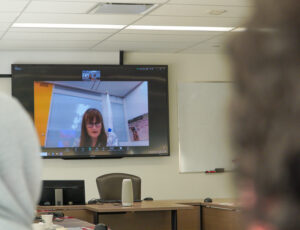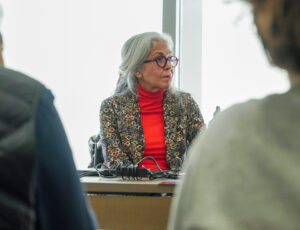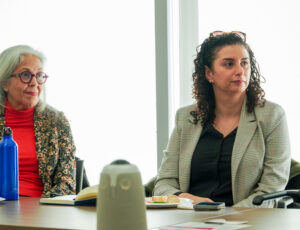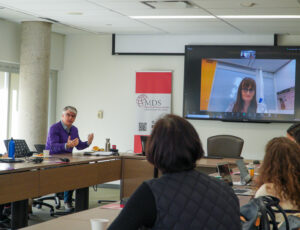On November 25, 2024, Carleton University’s Migration and Diaspora Studies Department, in collaboration with UNHCR and LERRN, hosted a hybrid discussion with Dr. Madeline Garlick, Chief of Protection Policy and Legal Advice at UNHCR in Geneva, on critical themes in global forced migration policy today. Students, faculty members, and local partners were also joined by special guests, Carole Dahan, a senior legal advisor with the UNHCR Office in Geneva, and Azadeh Tamjeedi, senior legal officer at UNHCR in Canada. The discussion was moderated by James Milner.
As the world grapples with the increasing scale of global displacement and uncertainty, Dr. Garlick asserted that it becomes ever more crucial to uphold humanitarian principles and international solutions because “moving away from international obligations is not going to be the answer that’s going to solve these phenomena alone.” It is with this conviction that UNHCR and its partners are responding to climate change, new wars and existing conflicts, breaches of international humanitarian law, and the interconnected drivers of displacement. Reflecting on these conditions, she emphasized that the 1951 Convention continues to be relevant, and thus, adhering to the fundamental principles of the migration regime is critically important because of its universal and unique position:
“From UNHCR’s perspective, we would argue that the answer to deal with perceived, chaotic and uncontrolled arrivals is not to step back from the only instrument that comes close to providing a universally agreed framework for dealing with such arrivals”
In efforts to address the challenges faced by actors in the regime, Dr. Garlick noted how UNHCR has been working to develop a routes-based approach, which aims to reduce harm along mixed movement routes. This response will work with partners and states to more effectively manage migration, starting from countries of origin, through transit states, and to their destinations. She highlighted the six key pillars of this approach, which include:
- Protection, sensitive entry, management, and admission in line with international refugee law
- Reinforcing asylum systems as well as rights-based migration governance
- Addressing immediate protection, assistance, and humanitarian needs, as well as providing assistance to victims of trafficking and survivors of gender-based violence
- Including national services and developing support for host countries and host communities along key routes
- Enabling people to move across safe and regular pathways
- Supporting safe and dignified returns
Dr. Garlick expressed optimistic views for the future and praised the growing collaboration between actors in the regime, as well as the growing influence of refugee leadership in research, advocacy, and policy initiatives. She underscored the pivotal importance of meaningful participation and shared how the valuable contributions of those with lived experience of displacement “can open up our perspectives on how we should be understanding and approaching challenges.”
The presentation was followed by an enlightening Q&A session with members of the audience raising thoughtful questions about collective action, expanding principles of protection, regional instruments of temporary protection, the shortcomings of humanitarian aid, and the power of students to be changemakers.
To listen to the event discussion, follow the link below.
This event was organized in the context of the Sérgio Vieira de Mello Chair program, a global initiative designed to enhance the role of universities in supporting responses and solutions to forced migration. This past June, Carleton signed an MOU with UNHCR Canada, making it the first university in Canada to host a de Mello Chair.
For more information on Carleton’s commitment to supporting refugees and the Department of Migration and Diaspora Studies’ leadership in teaching, research, and community engagement, click here.
This report was prepared by Lilly Neang, LERRN Knowledge Mobilization Officer.




